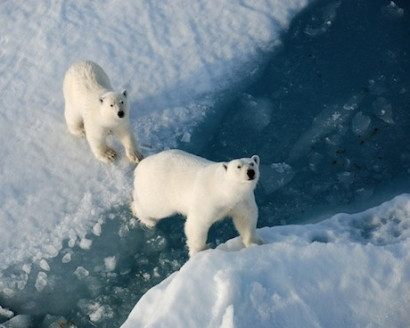Polar bear ancestry traced back to one brown bear from Ireland
 All living polar bears can trace their genetic lineage back to a single, female ancestor -- a brown bear from Ireland, who lived around 20,000 to 50,000 years ago. Thanks to climate change in the North Atlantic ice sheets around the time of the last ice age, the two types of bears would have periodically overlapped. In Ireland, it appears that they interbred, leading to a hybridisation event that plopped maternal DNA from brown bears into polar bears. This event probably led to a fixation of the modern polar bear's mitochondrial DNA, where a drastic reduction in genetic variation meant the entire gene pool was flooded with just one form of a particular gene, from just one female bear.Researchers can figure this out thanks to that oh-so helpfulmitochondrial DNA (mtDNA). This is a maternal part of the genome that is -- unlike most of the nuclear DNA -- passed down exclusively from the mother to her offspring. The sperm's tiny cache of mtDNA, on the other hand, is destroyed upon fertilisation. This allows us to connect the maternal lines and trace back a species' genetic lineage through the mother's line. We've done it with humans too, and found that all living humans descend from one woman in Africa -- we call her Mitochondrial Eve. Previous researchers have suggested that the polar bear's "eve" lived on the ABC Islands -- the Alaskan islands of Admiralty, Baranof, and Chichagof -- only 14,000 years ago. But a new international team, lead by Beth Shapiro from Penn State University, has found a much earlier inter-breeding event that led to brown bear mtDNA creeping into the polar bear gene pool. "We used DNA from living polar bears, and DNA from fossils around the world," Mark Thomas, from University College London's research department of genetics, evolution and environment and co-author of the paper, told Wired.co.uk in a phone interview. In all, 242 brown bear and polar bear mitochondrial lineages throughout the last 120,000 years and across multiple geographic range were sampled. They found that the fixation of the mitochondrial genome likely occurred during or just before the peak of the last ice age, possibly as early as 50,000 years ago, and near present-day Ireland. Those Irish brown bears are, of course, now extinct. They died out roughly 9,000 years ago. This tells us that species aren't always as fixed and tidy as we might hope, and also that "hybridisation doesn't always lead to dead ends", says Thomas. This popular idea that hybridisations "dirty" the species isn't necessarily true, and mixing two species together could be good for, or even essential to, the species' survival. Thomas finds potential similarities to this in humans. Earlier this year, Peter Parham, professor of microbiology at Stanford, presented evidence which shows that early Europeans gained many of their genes for battling northern diseases after interbreeding with neanderthals. There is a possibility that breeding with neanderthals gave early humans a handy leg-up. The polar bear research also has consequences for the future conservation of species -- including the polar bear which is considered vulnerable, with eight of the 19 polar bear subpopulations in decline. "Scientists should reconsider conservation efforts focused not just on polar bears, but also on hybrids, since hybrids may play an underappreciated role in the survival of certain species," said Beth Shapiro. We are still seeing interbreeding of these two bears today, especially with a similar change in the arctic climate and melting glacial ice, fewer sea-ice days, longer open-water periods during summer, and rising sea levels. In 2006, a hunter found (and killed) a half-polar-half-grizzly hybrid (sometimes called a pizzly bear), in 2010 a Canadian hunter found (and killed) a hybrid, and in a 2010 report, researchers said they've spotted seven brown bears in the polar bear-only Wapusk National Park. |




















